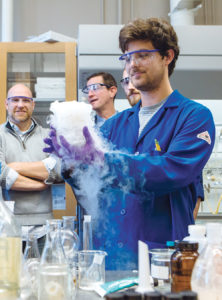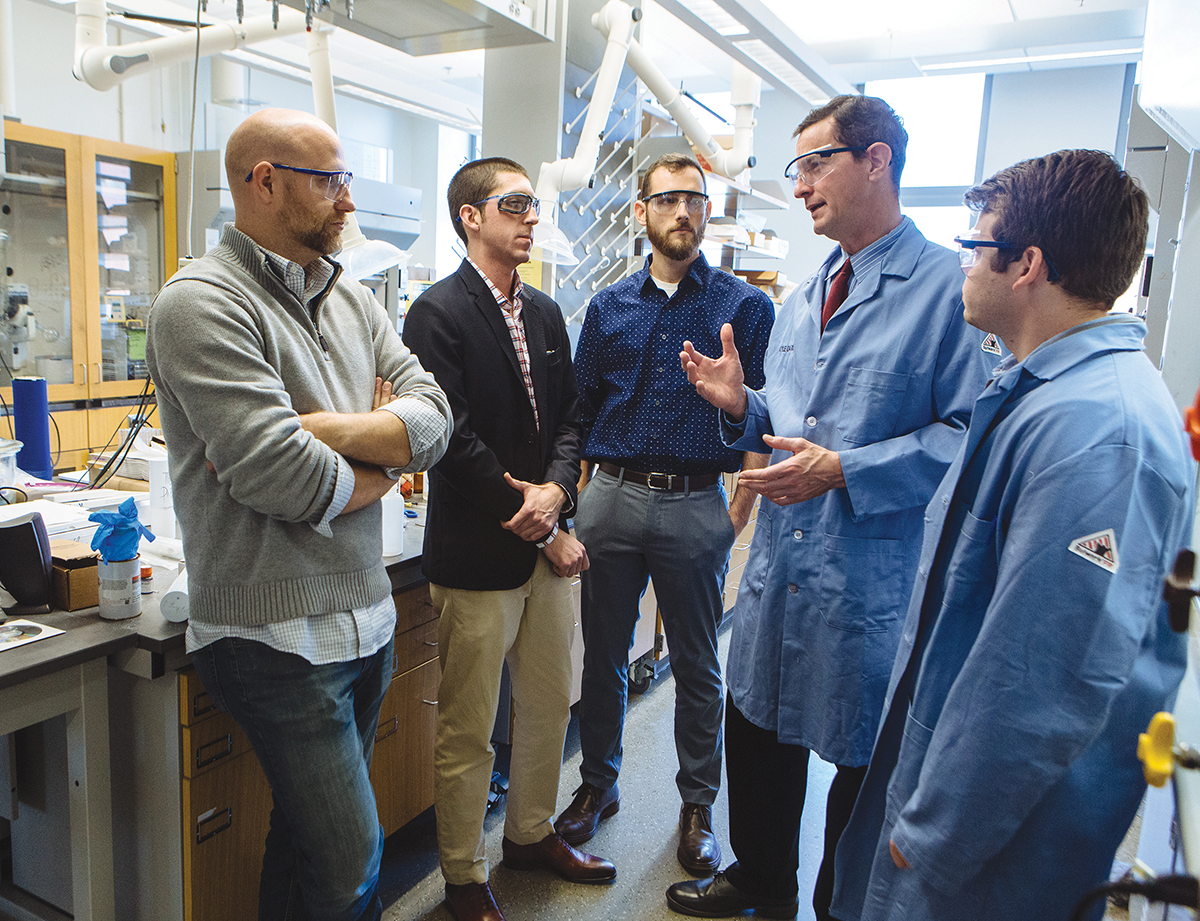Five weeks prior to celebrating its first year in business, Alcinous Pharmaceuticals received a $50,000 Innovation Voucher from R.I. Commerce Corp.
The microcompany had been pursuing the state funding for quite a while, said Ken Rose, chief scientific officer, adding the announcement was a “relief.”
One of three companies approved to receive voucher funding in an Oct. 30 Commerce meeting, Alcinous Pharmaceuticals will use the voucher to fund the creation of a new, less toxic, more-effective class of Poly ADP-Ribose Polymerase, or PARP, inhibitors – oncology drugs that combat aggressive forms of cancer, such as breast and ovarian – over the next eight months to a year. The company is performing its research in partnership with the University of Rhode Island’s chemistry department.
Innovation Vouchers – an award of between $5,000 and $50,000 to fund small-business research and design in partnership with an Ocean State university, research center or medical facility – are funded each year through the state budget and presented by R.I. Commerce Corp.
These awards are available to Rhode Island-based companies with fewer than 500 employees. While many past recipients’ employee counts don’t come close to 500, this figure is the U.S. Small Business Administration’s nationwide definition of a small business.
As of Oct. 30, according to Commerce, a total of 43 Innovation Vouchers have been awarded to date, representing a $2 million state investment in small-business research and design.
According to PBN research, of the 43 total vouchers awarded to date, 17, or 39.5 percent, are focused on health care, biomedical or pharmaceutical research and design. PBN research also shows URI is involved with 18 vouchers, five of which are health care-, biomedical- or pharmaceutical-related projects.
Previous health care-related Innovation Voucher recipients include East Greenwich’s S2S Surgical LLC ($37,613), ProThera Biologics Inc. in Providence ($50,000) and Narragansett’s CoreMechanics LLC ($50,000).
Providence-based EpiVax Inc. and Vitae Industries Inc. have each received two vouchers since the voucher program began in January 2016. EpiVax has garnered two $50,000 vouchers for its biotechnology research while Vitae has received one $40,000 voucher and one $50,000 voucher for its biomedical research.
Alcinous, however, is determined for their PARP inhibitor research to stand out from the pack.
In today’s market, said Benjamin Barlock, chief technology officer, “there are lots of side effects associated with” cancer-fighting drugs ranging from nausea to vomiting. Maladies “typical of chemotherapy,” he explained.
The team hopes Alcinous Pharmaceuticals’ end result will differ from what’s currently available in three major ways. First, it will be “potent” enough to be administered in small doses – via intravenous injection or an oral supplement – to the patient, but also devoid of the “awful” side effects while packing a “higher efficacy rate,” said Rose.
[caption id="attachment_183521" align="alignright" width="222"]

LAB WORK: From left, Brenton DeBoef, URI professor of chemistry, and Alcinous Pharmaceutical team members David Worthen, chief operations officer, and Benjamin Barlock, chief technology officer, observe URI graduate student David Robinson in DeBoef’s lab in the Beaupre Center at URI. / PBN PHOTO/RUPERT WHITELEY[/caption]
The CSO said the company’s goal is to dampen the “death sentence” that is often associated with a breast or ovarian cancer diagnosis. He said some treatment courses result in an estimated three additional months of life but carry harmful side effects that may not make the therapy worth the discomfort.
“A successful clinical trial is three months [of extended life]. We refute that as an optimal measure,” he said, posing the question: “If you’re going to make a drug that helps your patient survive for another three months, but half-kills them [on the way], is that worth it?”
Scheduling Alcinous Pharmaceuticals’ research is “open-ended,” said Rose. After the voucher runs its course, the company plans to move into animal testing, which can last from “three months to several years” said Rose, with a goal of entering clinical research trials “within the next three years.”
Much of the company’s accomplishments rest on the resources available to them at URI. Without the aid of the state’s flagship research institute, Rose said another six months to a year would be added to their research timeline, and what progress they have made since founding in December 2016 would have cost “tens of thousands of dollars, and we can’t afford that.”
Alcinous Pharmaceutical employees – Rose, Barlock and CEO Nick DaSilva – are current Ph.D. students in the URI College of Pharmacy. Rose said collaboration with Brenton DeBoef, URI professor of chemistry, and his laboratory has been “pivotal” to their success.
“Instruments exist anywhere, in the end we needed to find a group that would work well with us and that’s definitely [DeBoef] and his graduate students,” said Rose.
Alcinous Pharmaceuticals’ research is “distinctive” and indicative of “how drug discovery will be done” going forward, said DeBoef.
Large pharmaceutical companies are also developing PARP inhibitors, he added, but Rose has “discovered” a new way to utilize the enzyme not yet utilized by the industry.
“This is a brand-new way to think about treating cancer,” said DeBoef.
While Alcinous Pharmaceuticals’ research is still in the hypothesis stage, DeBoef said: “If we can pull it off, it’s never been done before.”














